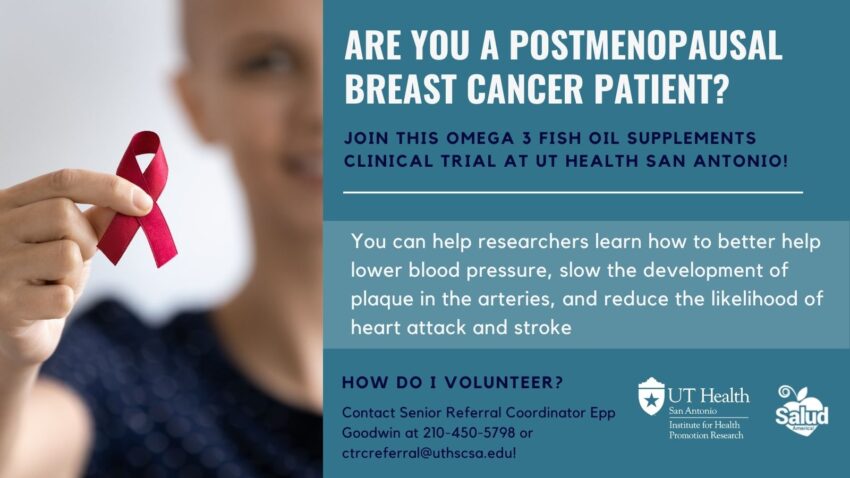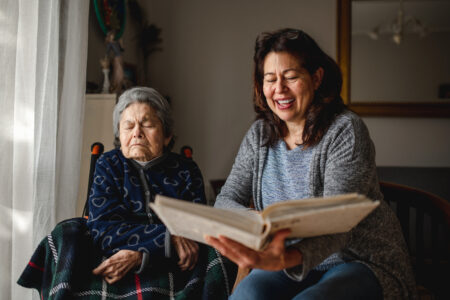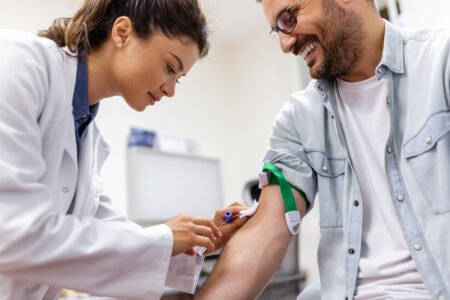
Share On Social!
Omega 3 fatty acids are essential nutrients.
Studies show omega 3 fish oil—which contains both docosahexaenoic acid (DHA) and eicosapentaenoic acid—may help lower blood pressure, slow the development of plaque in the arteries, and reduce the likelihood of heart attack and stroke.
With the rising popularity of omega 3 fish oil supplements, researchers are conducting clinical trials to test their benefits for other health issues.
This is why Dr. Andrew Brenner and his team at UT Health San Antonio are seeking volunteers for his clinical trial to explore of how omega 3 fatty acids can impact postmenopausal breast cancer patients.
“Fish oil supplements with omega 3 fatty acids have been shown to stop or slow down the growth and development of breast cancer cells in laboratory studies of mice and breast cancer cells, but this impact among humans need more study,” said Dr. Amelie Ramirez, director of the Institute for Health Promotion Research and the Salud America! program at UT Health San Antonio. “Trials like Dr. Brenner’s can pave the way for new discoveries that can help breast cancer patients now and in the future.”
Join the Omega 3 Clinical Trial at UT Health San Antonio by contacting Senior Referral Coordinator Epp Goodwin at 210-450-5798 or ctrcreferral@uthscsa.edu!
What is the Omega 3 Clinical Trial at UT Health San Antonio?
Brenner is a nationally known expert in the treatment of brain and breast cancers.
His team works on developing new treatments with the support of the U.S. Food and Drug Administration, National Cancer Institute, and Cancer Prevention and Research Institute of Texas. He has published over 50 original research articles in peer reviewed journals.
In this study, Brenner and his team will assess the impact of the dietary supplement omega 3 free fatty acids and/or letrozole on obese, postmenopausal breast cancer patients.
Aromatase inhibitors, including letrozole, aim to stop the production of estrogen in postmenopausal women. They work by blocking the enzyme aromatase, which turns the hormone androgen into small amounts of estrogen in the body. This means that less estrogen is available to stimulate the growth of hormone-receptor-positive breast cancer cells, according to breastcancer.org.
The study will be prospective and comparative. This means physicians will monitor patient levels and compare results to other participants.
This is critical, given the ties between obesity and cancer.
“Obesity is a complex health issue resulting from a combination of systemic causes and individual factors such as behavior and genetics,” according to the CDC. “Behaviors can include physical activity, inactivity, dietary patterns, medication use, and other exposures. Additional contributing factors include the food and physical activity environment, and food marketing and promotion.”
Latinos have higher rates of obesity than their peers.
“Reasons for the higher prevalence of obesity among Hispanics, especially women, are likely complex,” according to the American Cancer Society. “For example, a large proportion of Hispanics in the US have lower socioeconomic status, which is generally associated with higher obesity prevalence; however, differences in obesity by socioeconomic status among Hispanic women are very small.”
Join the Omega 3 Clinical Trial at UT Health San Antonio by contacting Senior Referral Coordinator Epp Goodwin at 210-450-5798 or ctrcreferral@uthscsa.edu!
Who Can Volunteer for the Omega 3 Clinical Trial at UT Health San Antonio?
Inclusion Criteria:
- At least age 18
- Postmenopausal as confirmed in medical history

- Ability to understand the purposes and risks of the study and has signed a written informed consent form
- Estrogen receptor positive breast cancer
- Body mass index of 30 or greater
- Consented for tissue collection
Exclusion Criteria:
- Cachexia
- Active systemic illness (infection including viral illnesses such as Hepatitis and HIV)
- Chronic use of NSAIDs (nonsteroidal anti-inflammatory drugs) aspirin or omega-3 free fatty acid supplementation within the last 60 days (defined as greater than or equal to 7 consecutive days)
- Any NSAIDs aspirin or omega-3 free fatty acid supplementation within the last 14 days
- History of medical noncompliance
- Scheduled date of surgical resection that would limit the amount of time taking the intervention to less than 21 days
Join the Omega 3 Clinical Trial at UT Health San Antonio by contacting Senior Referral Coordinator Epp Goodwin at 210-450-5798 or ctrcreferral@uthscsa.edu!
What Will Volunteers Do as Part of the Omega 3 Clinical Trial at UT Health San Antonio?
Brenner and his team will assign patients to one of three study arms:
- Letrozole 2.5 mg by mouth daily for 30 days
- Fish oil 2700 mg by mouth daily for 30 days
- Letrozole 2.5 mg and fish oil 2700 mg by mouth daily for 30 days
In that time, researchers hope to see:
- Change in levels of aromatase target gene.
- Change in serum levels of PGE2 (prostaglandin E2).
Join the Omega 3 Clinical Trial at UT Health San Antonio by contacting Senior Referral Coordinator Epp Goodwin at 210-450-5798 or ctrcreferral@uthscsa.edu!
Contact Now to Volunteer for the Omega 3 Clinical Trial at UT Health San Antonio!
Participating in a clinical trial can help you, your family, and future cancer survivors.
Just ask Emelia Asto-Flores.
Asto-Flores, a community health educator in Florida, saw how the COVID-19 pandemic devastated Latinos, and she decided to enroll in a vaccine clinical trial to help her people.
Not only did she help researchers make sure the vaccine is safe for Latinos, but the trial also gave her the knowledge and confidence to encourage others to get their shot.
“Representation is important in a clinical trial,” Asto-Flores said. “You wouldn’t want a clinical trial to be just consisted of one group. These results need to be proportionate to our diverse communities. It’s so important for us as members of the [Latino] community to take that leadership role that could save lives. So those that are a part of that can say, ‘Hey, these results care representative of my community.’”
At UT Health San Antonio, Dr. Amelie Ramirez is creating new ways to encourage Latinos to volunteer for cancer and Alzheimer’s clinical trials. This work is supported by a grant from Genentech, a member of the Roche Group.
“Latinos in clinical trials are not only helping themselves, but they are also building a future with better treatments that can help their families and communities in the future,” Ramirez said.
Join the Omega 3 Clinical Trial at UT Health San Antonio by contacting Senior Referral Coordinator Epp Goodwin at 210-450-5798 or ctrcreferral@uthscsa.edu!
Explore More:
Clinical TrialsBy The Numbers
142
Percent
Expected rise in Latino cancer cases in coming years



